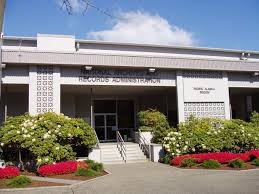NARA Seattle Facility Update

Repeated from January, 2021 with April update
Public Hearing: Washington State Attorney General's Office
January 19, 2021, I attended a public hearing sponsored by the Office of Washington State Attorney General, Bob Ferguson, requesting public testimony regarding the proposal by the Public Buildings Reform Board to close the National Archives and Records Administration facility in Seattle, move the records to either California or Missouri, and sell the building.The hearing was held virtually via Zoom. There was a limit of 200 people and the Attorney General’s Office were stunned by the number of people who attempted to join the call. If we were not testifying, we were asked to watch the call on TV W, as they could not accommodate all who wanted to join. Representatives of the Seattle Genealogical Society, the Orcas Island Society, and Sue Sheldon representing the Mason County Society had already testified, and I did not feel I had anything significant to add, so I moved over to TV W to allow more people to join the call.
Overwhelming Interest
In addition to the States of Washington and Oregon and 29 Native American tribes, many other interests were represented. A representative of Senator Patty Murray presented testimony as well as Washington State Secretary of State Kim Wyman.
Several elected officials who are tribal members testified. Additionally, many tribal representatives gave moving testimony of the importance of the records to researching treaties and establishing their rights.
Critical Importance for Many Groups
The Director of the Burke Museum explained how important the records in Seattle are and have been to their research. The Director of the Wing Luke Museum explained the importance of the records of the Chinese Exclusion Act are to the local Chinese community. The representative of the Korean community spoke passionately that they are a small group and would not have the resources to travel to California or Missouri to research.
A former employee of the National Archives testified that many records would be lost in a transfer. That reminded me that an employee of the Seattle Archives had told me that the records that came down from Alaska when that Archive was closed were sitting in storage in a warehouse for lack of resources to process them. A researcher at Washington State University in the Tri-Cities who had worked in the Alaska Archive at the time of its closure also testified to the problem of record loss.Current and former forestry officials testified to their use of the panoramic forest photographs not only to plan forest fire control but also to study the practices of indigenous peoples in forestry management.
A retired King County demographer testified to the importance of the original records housed at the Archives to his work. I had no idea that King County had a demographer.
The President of the Northeast Seattle Community Club recounted how they had been contacted by the Department of Transportation when the 520 Bridge was being planned and how their research at NARA had identified an ancient Native American burying ground which had to be avoided in locating the approach.
One of the most interesting speakers was a physician from the University of Washington and the Veterans Administration Hospital who is researching genetic neurological diseases (think Alzheimer’s Disease). He explained how important access to familial records is to his research.
Attorney General Ferguson was visibly moved by the story told by a woman who had helped her father find his biological parents, partially through research in records at NARA Seattle. He was an Alaska native who had been sold to adoptive parents for $10 as an infant.
An archivist from Port Townsend emphatically made the point that researchers outside metropolitan areas do not always have digital literacy or digital access.
The overreaching theme of all the testimony was the problem of removing access to public records from people who use them for many different reasons.
The hearing was recorded and the recording and a transcription will be delivered to the Public Buildings Reform Board.
We applaud Attorney General Ferguson for his efforts and eagerly await the next developments.

Since January. . .
The campaign led by Senators Maria Cantwell, D-Wash., and Lisa Murkowski, R-Alaska, 25 of the Washington, Alaska, Oregon and Idaho congressional delegations; a bill introduced by Senator Patty Murray, D-Wash., and a federal lawsuit by Washington Attorney General Bob Ferguson, along with 29 tribes and various other groups succeeded in halting the sale. [3]




Comments
Post a Comment